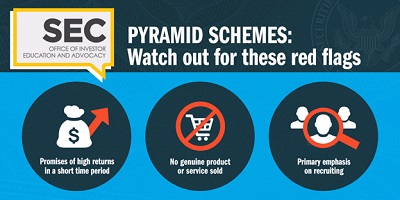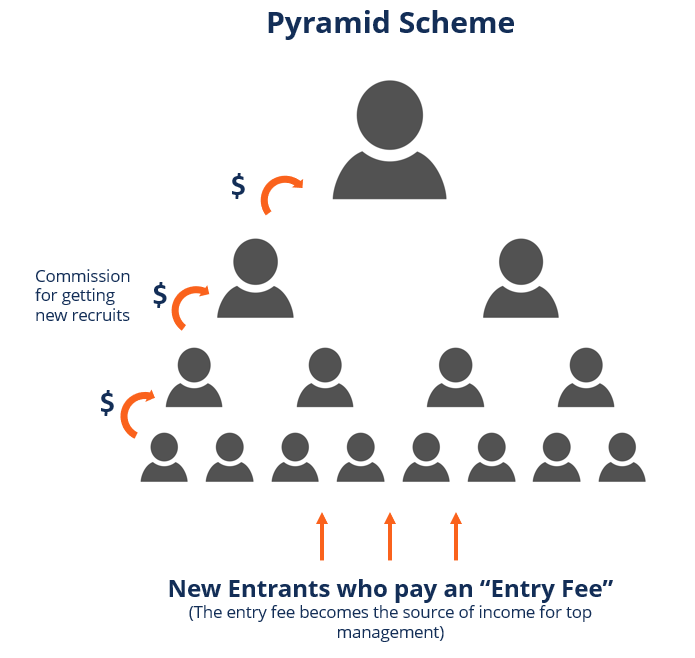
Pyramids or pyramid schemes are illegal in many countries and have been a scourge for decades, bilking innocent people out of their hard-earned money. At first glance, they may seem like legitimate business opportunities or investment clubs, but they are anything but.
Instead, they prey on people’s desperation and trust, promising financial freedom and prosperity but ultimately delivering only disappointment and financial ruin.
We aim to help you avoid becoming a victim of one version of these insidious scams.
What is a Pyramid Scheme?
A pyramid scheme is a fraudulent business model that relies on recruiting participants to make money. In a typical pyramid scheme, participants pay an upfront fee to join a business venture.
Then, they are promised to make money by recruiting other participants to join them. Each recruit must pay an upfront fee, and between recruits and the person who recruited them in person-to-person sales, one participant earns a commission.
As more and more people join illegal pyramid schemes, the top of the pyramid grows, emphasizing the people at the top earning the most money while those at the bottom struggle to recoup their initial investment.
Eventually, the illegal pyramid scheme becomes unsustainable, as there are not enough recruits to keep it going, the pyramid collapses, and the people at the bottom lose their money.
How Pyramid Schemes Work:
Pyramid schemes are often disguised as legitimate products or services or business opportunities, such as multilevel marketing (MLM) or direct sales. However, key differences exist between direct retail sales network marketing or legitimate MLM product or service and a pyramid scheme.
In a legitimate MLM, participants earn money by selling products or services and a commission on the sales made by the people they recruit. However, in a pyramid scheme, the focus is on recruiting new participants, and there may not even be any products or services sold.
Another key difference is that in a classic pyramid scheme, however, participants are often required to pay a large upfront fee to join. At the same time, in a legitimate MLM company, there may be a small startup cost more participants paid, but it is usually minimal.

Identifying Pyramid Schemes:
Pyramid schemes can be challenging to identify, as they often use misleading marketing tactics to lure in unsuspecting participants and attempt the victim later investors who lose money. However, there are some red flags to watch out for.
One of the giant red flags is if the focus is on recruiting new participants or network marketing rather than selling actual products or services.
Also, if you are required to pay a hefty upfront fee to join, or if you are promised that you will make a lot of money quickly without having to make enough money or do much work to sell products first, these are warning signs.
Another warning sign is if the company has a complicated commission structure that is difficult to understand. Legitimate MLMs usually have a compensation structure and a straightforward commission structure that is easy to understand.
Common Examples of Pyramid Schemes
- Ponzi Schemes
“Ponzi schemes or schemes are named after Charles Ponzi, who famously ran a fraudulent investment scheme in the early 20th century. a Ponzi scheme or schemes promise high returns on investments from new distributors, but in reality, the money from new investors is used to pay off earlier investors.
The Ponzi scheme collapsed when there were no more new investors, and the money ran out.
- Multilevel Marketing (MLM) Schemes
Multilevel marketing (MLM) schemes are often confused with classic pyramid scheme or schemes, but there is a crucial difference. MLMs sell products or services and offer commissions for product sales and recruiting new members.
While MLMs can be legitimate businesses, some companies use deceptive tactics to make product sales, lure in new members and make false claims about their products.
- Gifting Circles
Gifting circles, also known as “women’s empowerment circles,” are pyramid schemes that target women. Participants are often promised passive income and significant returns on their investment if they recruit new members.
However, the only way to make money is to get new money or convince others to join the circle, and eventually, the pyramid selling pyramid scheme often collapses.

How to Avoid Pyramid Schemes
- Do Your Research
Before investing in any opportunity, do your research. Check the company’s background, reputation, and track record and look for reviews or complaints about the company’s products from other investors.
- Watch Out for High-Pressure Sales Tactics
Pyramid schemes often use high-pressure sales tactics to convince people to invest their lost money. Be wary of anyone who promises quick and easy profits, and don’t let yourself be pressured into deciding before you’re ready.
- Understand the Business Model
If a company’s sales literature or scheme’s business model relies solely on recruiting new paid members, recruits sell it; it’s likely a pyramid scheme. Legitimate companies generate revenue by selling products or services, not recruiting new members.
How to Protect Yourself from Pyramid Schemes?
- Do your research: Before investing in any scheme, research the company and its products or services thoroughly. Check the company’s registration status with the appropriate regulatory agency.
- Don’t be pressured: If the promoter pressures you to invest or sign up immediately, it is likely a scam. Instead, take your time to make an informed decision.
- Avoid high-risk investments: Avoid investments with high returns for little risk.
- Trust your instincts: If something seems too good to be true, it probably is.
Conclusion:
Pyramid schemes are fraudulent business model and illegal pyramid scheme that preys on people’s desperation and trust. They promise financial freedom and prosperity but ultimately deliver only disappointment and ruin.
To avoid becoming a victim of a pyramid scheme, it is essential to research and be wary of any opportunity that seems too good to be true. Watch out for red flags in such schemes, such as a focus on recruiting new participants, a hefty upfront fee to join a pyramid scheme, and a complicated commission structure for most investors.
Remember, if something seems too good to be true, it probably is. So don’t fall for the promise of easy money – instead, focus more money on building a legitimate business or more money solely investing in legitimate opportunities with a proven track record of success.
CoopBusiness is a revolutionary cooperative business-building platform that empowers individuals to become entrepreneurs, business owners, and financially independent.
As a member, you’ll receive top-level business mentorship, access to our proprietary business systems, and the opportunity to access the funds you want to turn your business ideas into reality.